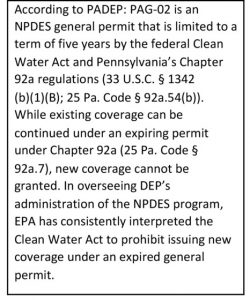Pennsylvania Fails to Timely Reissue General Permit for Stormwater Discharges Associated with Construction Activities – After December 7, 2017, Individual NPDES Permits Will Be Required For New Projects
October 19, 2017
Publications
 After December 7, 2017, new Pennsylvania land development projects that disturb in total over an acre of land will require an individual National Pollutant Discharge Elimination System (“NPDES’) permit. Although the Pennsylvania Department of Environmental Protection (“PaDEP”) missed the window to timely reauthorize General Permit PAG-02, it has administratively extended existing issued permits which have not expired and do not expire in the interim, until December 7, 2018. PaDEP has also stated that it intends to reissue a final PAG-02 well before December 8, 2018, most likely by the spring of 2018.
After December 7, 2017, new Pennsylvania land development projects that disturb in total over an acre of land will require an individual National Pollutant Discharge Elimination System (“NPDES’) permit. Although the Pennsylvania Department of Environmental Protection (“PaDEP”) missed the window to timely reauthorize General Permit PAG-02, it has administratively extended existing issued permits which have not expired and do not expire in the interim, until December 7, 2018. PaDEP has also stated that it intends to reissue a final PAG-02 well before December 8, 2018, most likely by the spring of 2018.
Furthermore, by administratively extending the existing PAG-02, PaDEP enables any previously issued PAG-02 permit that will expire or require amendment after December 7, 2017, to be renewed or amended by Conservation Districts, provided the coverage area is not expanded and the renewal/amendment is applied for on or before December 7, 2017. We caution, however, that only timely application for renewal will extend your existing PAG-02 beyond its expiration.
After December 7, 2017 (until PaDEP finalizes the PAG-02 reissue), all new or amended acre-plus construction activity stormwater permits must be individual NPDES permits. While individual permits are typically reviewed and issued by PaDEP, not Conservation Districts, PaDEP has indicated that if your project would have qualified for the PAG-02, you may submit the same information and fees and follow the same instructions for an individual permit application as you would have for a PAG-02 NOI (Form 3150-PM-BWEW0035), by checking the box for the “Individual” Permit Type. Similarly, if your NOI is pending and will not be issued by December 7, 2017, you should submit Form 3150-PM-BWEW0035, with the box for the “Individual” Permit Type checked. Conservation Districts will conduct the entire review, with consultation with PaDEP as necessary, and will issue the individual permit.
However, if you do not anticipate beginning construction prior to the date PaDEP finalizes the PAG-02 reissue, you may submit your PAG-02 to your Conservation District and request that a review be conducted, but final action will be delayed until PaDEP completes the reissue.
Application for an individual permit would typically be published for comment (not simply the issuance). The permit itself may contain additional terms and conditions, and the full review would be performed by PaDEP. However, during this interim period, PaDEP has indicated that for new projects that would normally qualify for PAG-02 coverage, conservation districts will conduct the entire review (with consultation with PaDEP as necessary) and issue the permit. It further provides that the applicant may submit the same information and fees for an individual permit application as it would for a PAG-02 Notice of Intent, but make sure to check the box for “Individual” for Permit Type and follow the applicable instructions as if the applicant was submitting a PAG-02 NOI. Typically individual permits are reserved for projects in special protection waters and projects within an impaired watershed.
PaDEP has established a webpage for updated information on this “Construction Stormwater” Issue. It may be accessed here.
If you have questions about construction stormwater permits in general or your project in particular, please contact either Scott A. Gould (717.237. 5304, sgould@mcneeslaw.com) or Steve Matzura (717.237.5276, smatzura@mcneeslaw.com)
© 2017 McNees Wallace & Nurick LLC
McNees Environmental & Real Estate Development Alert is presented with the understanding that the publisher does not render specific legal, accounting or other professional service to the reader. Due to the rapidly changing nature of the law, information contained in this publication may become outdated. Anyone using this material must always research original sources of authority and update this information to ensure accuracy and applicability to specific legal matters. In no event will the authors, the reviewers or the publisher be liable for any damage, whether direct, indirect or consequential, claimed to result from the use of this material.

